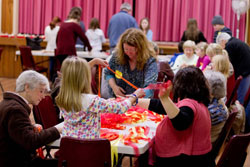
THE FRESH Expressions movement is creating a buzz of excitement in the Uniting Church around new kinds of mission and outreach.
In essence, the movement isn’t doing anything new at all.
It is almost taking mission and outreach and the activity of ‘church’ back to its fundamental roots: being Christ in the
community.
In 2005 the Church of England established their Fresh Expressions initiative; a collaboration between the Archbishops of Canterbury and York and the Methodist Council.
It began as a follow-up from the best-selling report, Missionshaped Church, published in 2004.
The report highlighted the need for a mix of “parish churches” and “network churches” that work in partnership across a wide geographical area.
The movement encourages new forms of church for an increasingly mobile world.
The Queensland Synod’s former Vision for Mission advocate, Rev Duncan Macleod, spent years creating networks and
fostering mission on the edges of the Church.
Now, he is Presbytery Minister (Mission and Education) with the Canberra Region Presbytery.
Fresh Expressions advocate, Rev Dave Male, is passionate about creating communities that connect with people outside the conventional Sunday service.
For seven years he was Vicar of the Net Church, in Huddersfield, UK, said to be one of the first official Fresh Expressions
activities.
Mr Male is now Associate Missioner of the Fresh Expressions team and Leader of the Mission Shaped Ministry Course for Cambridge and Suffolk.
He often visits Australia including recent trips to Adelaide and Perth.
“I desperately do not want this to be a blip in a declining church,” he told Church Times, the UK’s leading Anglican newspaper, in 2007.
“If this is God’s agenda for us we must be honest with ourselves about what really is happening on the ground and be prepared to continue to develop our thinking around the issues created.”
Mr Male told Journey the Fresh Expressions movement was about allowing the community to shape the church.
“It’s about mission shaping church rather than the church shaping mission.
“We are starting with mission and seeing what sort of contextual church is then beginning to grow,” he said.
Mr Male has been working on fresh expressions of church for more than 10 years now.
The fact that people still see this as a forward thinking movement shows how flexible it is to adapt to new technology and
the surroundings and the needs of the people involved.
But not everyone agrees.
In an ABC Religion and Ethics article, “Why the parish still matters” (22 March 2011), writer Alison Milbank said she does not disagree with the outreach of the Fresh Expressions movement, but rather, the philosophy.
“Form and content of faith are not so easily separated,” said the Associate Professor of Literature and Theology at the University of Nottingham, UK.
“In seeking this separation, the language and identity that forms us communally is quite lost because the meaning lies in the practices and not beneath them.
“The Fresh Expressions movement sees Christianity quite abstractly as a set of ideas, which can be separated from their
embodiment and then inserted into a new culture.”
Fresh Expressions and Evangelism Officer for the Uniting Church, South Australia, Rev Ruthmary Bond, said there are many churches already doing something that could fit under the Fresh Expressions banner, but perhaps just not calling it that.
For example, a ‘Pub Church’, a single parents group, or running a café could all be fresh expressions of church.
Ms Bond has been involved in the Fresh Expressions movement for six years and started in the Synod role in January this year.
“The challenge for the Uniting Church is to quickly come to an understanding of how we acknowledge these communities
and train ministers to lead in a missionary environment,” she said.
Her participation in the movement began quite organically.
“I had a small congregation who were concerned for their friends and talked with me about how they thought their friends
would feel uncomfortable coming to a traditional church service and what could we do.
“We took time to talk with people and see what would make them feel comfortable.
“This listening raised the points that people wanted space to ask questions and share what they believe.”
Ms Bond said being a place where people could go to explore faith, ask questions, have deep discussions, drink good coffee and eat became the centre point of their worship.
“People always opened up over a meal or having coffee and so we changed to a cafe congregation.”
Photo : A MessyChurch gathering at St Peter’s Uniting Church in Freshwater, NSW. MessyChurch, is a fresh expression of church and is a multi-age congregational planting strategy focused on connecting with ‘unchurched’ children and their families. By Dave Male
 JourneyOnline
JourneyOnline






